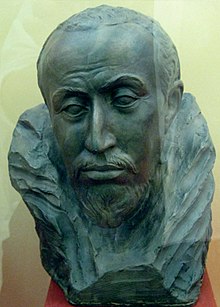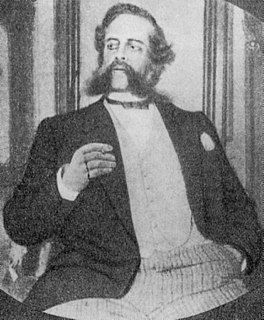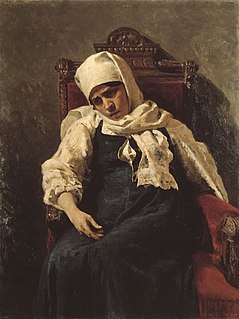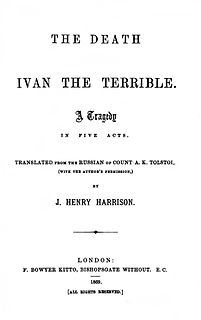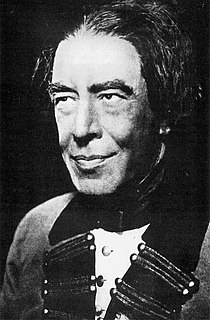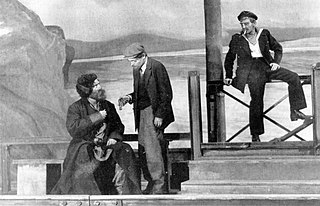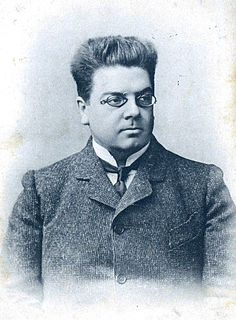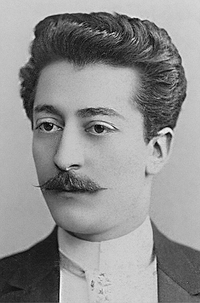| Tsar Fyodor Ioannovich | |
|---|---|
Forensic facial reconstruction of Tsar Fyodor Ioannovich, by M. Gerasimov (1963). | |
| Written by | Aleksey Konstantinovich Tolstoy |
| Date premiered | 12 October 1898 |
| Place premiered | Suvorin's theatre, Saint Petersburg |
| Original language | Russian |
| Genre | Historical drama |
Tsar Fyodor Ioannovich (Russian : Царь Фёдор Иоаннович, old orthography: Царь Ѳедоръ Іоанновичъ) is a 1868 historical drama by Aleksey Konstantinovich Tolstoy. [1] It is the second part of a trilogy that begins with The Death of Ivan the Terrible and concludes with Tsar Boris . [2] All three plays were banned by the censor. [3] Tsar Fyodor is written in blank verse and was influenced by the work of William Shakespeare, Casimir Delavigne, and Edward Bulwer-Lytton. [4] It dramatises the story of Feodor I of Russia, whom the play portrays as a good man who is a weak, ineffectual ruler. [5] The trilogy formed the core of Tolstoy's reputation as a writer in the Russia of his day and as a dramatist to this day. [1] It has been considered Tolstoy's masterpiece. [5]

Russian is an East Slavic language, which is official in the Russian Federation, Belarus, Kazakhstan and Kyrgyzstan, as well as being widely used throughout Eastern Europe, the Baltic states, the Caucasus and Central Asia. It was the de facto language of the Soviet Union until its dissolution on 25 December 1991. Although, nowadays, nearly three decades after the breakup of the Soviet Union, Russian is used in official capacity or in public life in all the post-Soviet nation-states, as well as in Israel and Mongolia, the rise of state-specific varieties of this language tends to be strongly denied in Russia, in line with the Russian World ideology.

Drama is the specific mode of fiction represented in performance: a play, opera, mime, ballet, etc, performed in a theatre, or on radio or television. Considered as a genre of poetry in general, the dramatic mode has been contrasted with the epic and the lyrical modes ever since Aristotle's Poetics —the earliest work of dramatic theory.

Count Aleksey Konstantinovich Tolstoy, often referred to as A. K. Tolstoy, was a Russian poet, novelist and playwright, considered to be the most important nineteenth-century Russian historical dramatist, primarily on the strength of his dramatic trilogy The Death of Ivan the Terrible (1866), Tsar Fyodor Ioannovich (1868), and Tsar Boris (1870). He also gained fame for his satirical works, published under his own name and under the collaborational pen name of Kozma Prutkov. His fictional works include the novella The Family of the Vourdalak, The Vampire (1841), and the historical novel Prince Serebrenni (1862).
Contents
Tsar Fyodor Ioannovich was first performed in an amateur production in Saint Petersburg in 1890. [6] It received its first professional production at Suvorin's theatre in Saint Petersburg on 12 October 1898, directed by P. P. Gnedich. [7] Two days later on 14 October, the play was performed as the inaugural production of the world-famous Moscow Art Theatre, directed by Constantin Stanislavski, with Ivan Moskvin in the lead role and Vsevolod Meyerhold as Prince Vasiliy Shuisky. [8] Since then the play has been revived frequently. [3] Incidental music was written for the play by Alexander Ilyinsky.

Amateur theatre, also known as amateur dramatics, is theatre performed by amateur actors and singers. Amateur theatre groups may stage plays, revues, musicals, light opera, pantomime or variety shows, and do so for the social activity as well as the artistic side. Productions may take place in venues ranging from the open air, community centres or schools to independent or major professional theatres and can be simple light entertainment or demanding drama.
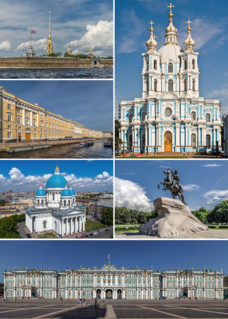
Saint Petersburg is Russia's second-largest city after Moscow, with 5 million inhabitants in 2012, part of the Saint Petersburg agglomeration with a population of 6.2 million (2015). An important Russian port on the Baltic Sea, it has a status of a federal subject.

The Moscow Art Theatre is a theatre company in Moscow. It was founded in 1898 by the seminal Russian theatre practitioner Konstantin Stanislavski, together with the playwright and director Vladimir Nemirovich-Danchenko. It was conceived as a venue for naturalistic theatre, in contrast to the melodramas that were Russia's dominant form of theatre at the time. The theatre, the first to regularly put on shows implementing Stanislavski's system, proved hugely influential in the acting world and in the development of modern American theatre and drama.
